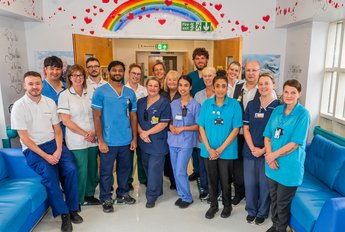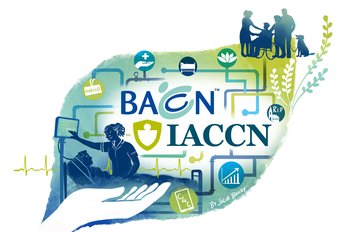Sessions

#BACCNCONF2025 Sessions
Learn more about some of the excellent sessions we have lined up for this year's conference.
Panel Discussion: Critical Care Countdown
Step into the action with Critical Care Countdown, a high-energy, knowledge-driven quiz tailored for today’s critical care nursing workforce. This isn’t just a game—it’s a professional development experience designed to reinforce essential clinical knowledge while reflecting on the broader transformation within the field of critical care nursing in the UK.
The landscape of critical care nursing is evolving rapidly, driven by technological innovation, demographic shifts, and changes in healthcare policy. As we respond to these pressures, priorities have shifted. Nurses are placing greater emphasis on patient-centred care, recognising the importance of emotional, psychological, and social needs alongside clinical expertise.
The integration of tools such as electronic health records, real-time monitoring, and telemedicine has enhanced patient safety and informed decision-making. However, these advances also require continuous learning to ensure that the technology supports, rather than replaces, the human touch.
Events like the COVID-19 pandemic have further underscored the profession's need for adaptability, resilience, and mental health support. Simultaneously, the growing emphasis on health equity is encouraging nurses to adopt advocacy roles, ensuring all patients receive dignified and appropriate care regardless of their background.
This quiz session embraces these evolving priorities, offering a space to reinforce core knowledge, reflect on the profession’s direction, and engage with peers in a meaningful (and fun) way.
This session will be supported by Juliette Anderson, Annette Richardson, Mandy Odell, Tracy Pilcher, and Nicki Credland—all past Chairs of the British Association of Critical Care Nurses (BACCN). (Click here to read about them!)
They bring a wealth of clinical, academic, and policy experience to the table. You’ll also be joined by our quiz master, current Chair, Ian Naldrett, as we explore, challenge, and celebrate the adaptability, resilience, and expertise of critical care nurses navigating today’s complex environment.
What to expect:
- A series of multiple-choice and countdown-style questions
- Real-world Critical Care Nursing-related topics
- Please bring your smartphone
- Play individually or in teams
- Prizes and recognition for top scorers
Why should you take part?
- Reinforce your clinical knowledge in a dynamic setting
- Reflect on the changing priorities of critical care nursing
- Sharpen your decision-making under pressure
- Celebrate the role of nurses as leaders in high-quality, equitable care
Are you ready?
Join our expert panel, your peers, and the BACCN leadership team for a session that will challenge your knowledge, test your reflexes, sharpen your thinking, and celebrate what it means to be a critical care nurse in today's ever-changing world, and honour the essential role you play in modern healthcare.
The countdown begins now…
Keynote - David McWilliams: "Thriving not just Surviving" Rehabilitation of Critical Illness (NCEPOD Report)
"Increasingly, patients admitted to critical care are more likely to survive hospital discharge. This survival is not without cost, as these patients (who are increasingly older and have chronic co-morbidities) are often left with significant physical, psychological, and cognitive morbidity collectively termed ‘post-intensive care syndrome’. As a result, survivors of critical illness have complex rehabilitation needs, both within the short and long term, impacting on return to pre-illness quality of life and function" NCEPOD
"Thriving Not Just Surviving" post-critical illness underscores the significance of transitioning from merely enduring a challenging health experience to actively pursuing a fulfilling and enriched life afterwards. This approach entails a fundamental shift in mindset, promoting growth, resilience, and overall wellness in the aftermath of illness.
Individuals recovering from critical illnesses often encounter a range of challenges, including physical rehabilitation, emotional distress, and necessary lifestyle adjustments. The focus on thriving encompasses the establishment of new goals, the cultivation of relationships, and the identification of joy in daily activities. Engaging in new interests, participating in support networks, and prioritizing mental health alongside physical recovery are integral aspects of this journey.
Practising self-compassion, acknowledging small achievements, and remaining receptive to new opportunities is essential to flourish following a critical illness genuinely. Each individual’s recovery path is unique, making it vital to discover a renewed sense of purpose and happiness throughout the healing process. Adopting this proactive mindset enables individuals to transform their experiences, emphasizing a life defined not by survival but by flourishing and growth.
In 2023 the National Confidential Enquiry into Patient Outcomes and Death undertook a review of the rehabilitation provided to survivors of critical illness. This review assessed the organisational structures and clinical practice across all stages of the recovery pathway, from early rehabilitation in the ICU to community support up to 12 months following hospital discharge. This session will share the major findings of the NCEPOD report, whilst highlighting the major recommendations to improve patient care and outcomes.
Keynote - Prof Rosalind Searle: #MeToo: Breaking the Silence within Critical Care Nursing
The #MeToo movement has sparked significant conversations across various sectors, shedding light on the pervasive issue of sexual violence. This vital movement has not only encouraged individuals to share their experiences but also underscored the systemic challenges related to sexual violence, particularly in healthcare environments where power dynamics often complicate reporting and support. In the specialized field of critical care nursing, professionals frequently face high-stress situations while working with patients who are critically ill or vulnerable.
Unfortunately, this intense atmosphere may inadvertently contribute to an environment where harassment and abuse can occur or go unnoticed. The emphasis on patient care often takes precedence, leading to a culture that may silence the voices of nurses who experience or witness sexual violence. Breaking the silence surrounding these issues is imperative for creating a safer workplace and fostering a culture of respect and dignity for all healthcare professionals. It is essential to recognize that the well-being of nursing staff directly impacts patient care quality.
When nurses feel safe and valued, they are better equipped to provide compassionate and effective care. Creating a supportive environment involves several key strategies. First, it's crucial to encourage an open dialogue about experiences related to sexual violence and harassment. This can be facilitated through workshops, seminars, and support groups where nurses can share their stories in a safe and confidential setting. Establishing a network of solidarity among nursing professionals can empower individuals to speak out against harassment, knowing they have the support of their peers.
Additionally, healthcare organisations and associations such as BACCN and, by association, the BACCN Conference Team must develop and enforce robust policies that protect staff from harassment. By implementing clear reporting procedures and ensuring that complaints are taken seriously and addressed promptly, healthcare associations can create a culture that does not tolerate inappropriate behaviour. Furthermore, organisational leadership should also take an active role in promoting a culture of safety and respect. Leaders can model appropriate behaviours and demonstrate their commitment to addressing sexual violence by prioritizing training, awareness campaigns, and support services for affected staff.
Ultimately, the goal is to cultivate an environment in critical care nursing where all staff members feel safe, respected, and empowered to contribute to patient care without the burden of harassment or intimidation. By championing these changes, the critical care nursing community can play a pivotal role in improving workplace safety and the overall quality of patient care. Together, nursing professionals can join the #MeToo movement as a call for justice and awareness and as a commitment to fostering a compassionate, respectful, and safe healthcare environment for everyone.
Panel Discussion: Critical Care Nursing: The Past, Present and the Future
Reflecting on the history of critical care nursing reveals a significant evolution in the discipline and the practices that have shaped contemporary care delivery. Historically, critical care nursing was primarily centred on fundamental life-saving techniques, with nurses functioning mainly as assistants to physicians. However, advancements in medical technology catalysed a substantial expansion of the role of critical care nurses. They emerged as integral members of healthcare teams, assuming responsibilities that included the implementation of complex treatment protocols and utilising critical thinking skills to assess and interpret patient data effectively.
The late twentieth century witnessed the establishment of specialised training programs, which marked a pivotal moment for critical care nursing. This development led to a more structured approach to education and certification, enabling nurses to acquire expertise in various areas, such as hemodynamic monitoring, ventilator management, and multi-organ support. The advent of advanced technologies, including telemetry and computerized health records, further transformed nursing practice, facilitating more precise and timely patient interventions. In addition, the understanding of patient-centred care has undergone considerable refinement. The focus has increasingly shifted towards holistic approaches considering patients' and their families' physical, emotional, and psychological needs.
This evolution underscores the growing recognition of the nurse’s patient advocate and educator role. Finally, recent decades have emphasised the importance of research and evidence-based practice, reinforcing the critical role of nursing in enhancing patient outcomes. The essential commitment of care nurses to advocating for quality care has been instrumental in shaping policies and standards within the healthcare system.
Critical care nursing is marked by continuous growth, adaptation, and an unwavering dedication to providing the highest standard of care in complex environments. As the field progresses, reflecting on these developments and their implications for the profession and patient welfare remains essential.
Keynote - Simon Noel: Compassionate Care in the Digital Age: Exploring the intersection of compassion and technological advancements in ICU
The intersection of compassion and technological advancements in the Intensive Care Unit (ICU) represents a critical area of inquiry that emphasises the potential for modern technology to enhance patient care while preserving the essential human element of empathy. Recent innovations, including telemedicine, artificial intelligence, and advanced monitoring systems, have fundamentally altered the landscape of healthcare delivery within intensive care settings.
On one hand, these technological advancements have significantly improved the accuracy and expediency of diagnoses and treatment protocols, thereby contributing to better patient outcomes. Remote monitoring systems, for instance, facilitate real-time data collection regarding patient conditions, allowing healthcare providers to execute timely interventions when required.
However, the barrier that technology represents in this environment is not new, but as technology progresses, it is imperative to address the challenge of ensuring that this continued reliance on technology does not diminish the vital human qualities of understanding and compassion. Compassionate care in the ICU is crucial not only for patients but also for their families, who frequently endure significant stress and anxiety during critical medical situations. While technological tools can enhance operational efficiency, cultivating a compassionate environment remains essential.
Educating healthcare professionals on effectively balancing technological capabilities with empathetic communication skills is vital to fostering a holistic approach to patient care. Ultimately, the objective should be to utilise technological innovations to augment the compassionate dimensions of medical treatment, ensuring that patients experience a sense of being acknowledged and cared for both physically and emotionally. As advancements progress, it will be imperative to integrate compassion into the framework of these innovations to shape the future of care in the ICU setting effectively.
This session will be presented by Simon Noel, Deputy CNIO at NHS England. For Simon's biography, click here.
Keynote - Kathleen Vollman - Vitamins for Nurturing the Nurse’s Soul
It is only when the caregiver’s needs are adequately addressed will they most effectively be able to help the patient and their families and keep the internal flame burning brightly. The key to nourishment of our nursing soul is a healthy dose of personal self-respect. Verbal abuse in language or tone contributes to chipping away at a nurse’s self-respect. This has worsened since COVID.
The session begins by examining the concept of respect, self-respect and practical tools to help manage potential threats to nurse’s self-respect within the work environment. The next step is to outline the daily vitamins for nurturing the person and the nurse.
Vitamin A helps to fortify a positive Attitude and supports the ability to Advocate for your patient and yourself.
Vitamin B includes leadership Behaviors while outlining strategies to ensure a healthy Balance between work and home life.
Vitamin C packs a powerful punch by developing Communication skills, creating a healthy work Culture, having the Courage to step forward but being flexible to handle Change while maintaining clinical and behavioral Competencies and seeking Certification to demonstrate your skill sets.
Vitamin D focuses on the “Do” or taking action and the Dedication and passion we need to make changes.
Vitamin E demonstrates that when Evidence is used to make decision, we demonstrate Excellence in patient care and life skills.
Each participant will work to create a vitamin recipe to nurture his or her nursing soul and help with personal and professional success.
Communities of Practice
A community of practice (CoP) represents a vibrant collective of individuals who share a passionate commitment to a specific domain, engaged in a dynamic journey of mutual learning. They exchange invaluable knowledge, insights, and effective practices, fostering profound personal and professional growth. These conference CoP sessions help spark innovation and cultivate a unified sense of purpose. Through discussions and exploring potential collaborative projects, they strengthen their connections, enhancing the transformative power of the shared learning experience. We will have the following CoP sessions at the conference. Click on each link to learn more:
Communities of Practice - Clinical Education in Critical Care
Unlocking Potential: Embracing Diversity in Critical Care Education
As professionals committed to delivering high-quality, patient-centred care, our ongoing education and shared learning are vital for navigating the complexities of critical care environments. In this Community of Practice session, we will explore the importance of embracing, recognising, and supporting diverse cognitive styles and learning preferences. Doing so can enhance the development of critical care nurses, foster greater inclusivity within our teams, and ultimately lead to improved patient outcomes.
Your insights and experiences are crucial in shaping an inclusive and effective educational framework that empowers all nurses to succeed. Thank you for your dedication to advancing critical care nursing and fostering a culture of continuous, inclusive learning.
Communities of Practice - Critical Care Outreach
We’re excited to facilitate this NOrF community of practice session once again—a dedicated space for professionals with shared interests and goals to come together, collaborate, and learn from one another. We aim to foster meaningful dialogue, share experiences, and develop actionable insights that enhance our work and collectively strengthen our expertise.
Whether you’re new to Critical Care Outreach or a seasoned practitioner, your insights and engagement are essential to creating a vibrant and supportive environment.
Join us at the BACCN Conference for an engaging session dedicated to critical care outreach practitioners. This session will highlight how a collaborative network can facilitate shared expertise, promote best practice, and improve patient outcomes across critical care outreach services nationwide.
We look forward to seeing you there!
Communities of Practice - #Rehablegends
Community of Practice Session: Moving from Surviving to Thriving After Critical Illness - Let’s talk about what’s happening and what you can do to help your patients
Thanks to advances in critical care, an increasing number of patients are surviving serious illnesses. But the journey doesn’t end there. Many face ongoing physical, emotional, and mental challenges, collectively called post-intensive care syndrome. Instead of just focusing on survival, we want to help patients truly thrive afterwards. That means supporting them in finding purpose, reconnecting with loved ones, and enjoying life again. It’s about shifting our mindset from just getting them out of the hospital to helping them get back to the things they love doing and the people they love.
In this session, we’ll explore:
- National recommendations to support patients after ICU
- The role of a rehabilitation co-ordinator role and its impact and value
- How best to support patients with transitions in care after ICU
- Strategies for personalised, holistic recovery and the information needs for patients and loved ones
- How you and your clinical teams can get involved in national projects to support recovery in the long and short term.
We’d love for you to be part of this conversation. Together, we can make a meaningful difference in helping patients transition from survival to living well - join this session and be a #Rehablegend.
Communities of Practice - Informatics / Digital
Balancing Compassion and Technology - Advancing Critical Care Nursing in the Digital Age: A Community of Practice session
We’re excited to facilitate this community of practice session —a space created for critical care nurses who are curious about how digital tools and informatics can support their work. It’s a chance to connect, share experiences, and learn from each other.
Technology is changing the way we care for patients in the ICU. Tools like AI, prediction tools, and advanced monitoring systems are helping us diagnose faster, treat more effectively, and keep a closer eye on our patients. With all these changes, it’s important to ask: how do we make sure we don’t lose the human touch?
This session is all about finding that balance. We’ll explore how working together and sharing knowledge can help us use technology in ways that strengthen—not replace—compassionate care. Whether you're just starting to explore digital tools or already using them in your practice, we’d love for you to join the conversation.
This session will be facilitated by Petro Bekker and David Maloney - check them out here
Research Stream
Tuesday 7th October
13:50-14:50 National Trial Updates
Natalie Pattinson, Andreas Xychris, Carla MacKintock
16:15- 17:00 Leveraging Social Media for Research: Strategies and Insights Workshop
Cassandra Sturgeon, NICC Social Media Editor




